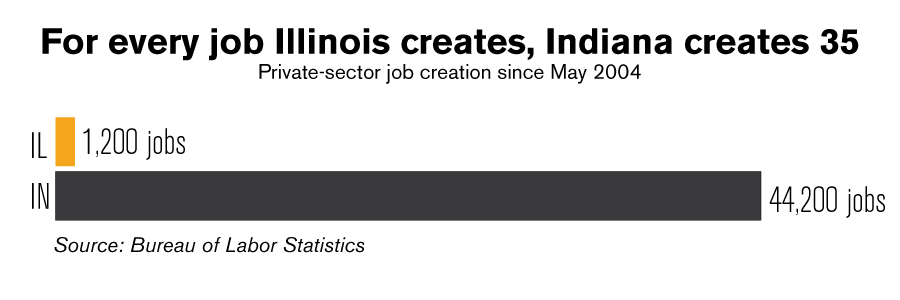Illinois private-sector payrolls fall by 5,400 as workers leave workforce
Illinois’ unemployment rate fell to 7.5 percent from 7.9 percent month-over-month, according to the Bureau of Labor Statistics’ most recent household survey. But there’s no reason to celebrate. Payroll jobs shrank by 2,600, with a loss of 5,400 private-sector jobs and an increase of 2,800 government jobs. The decline in the unemployment rate was driven...
Illinois’ unemployment rate fell to 7.5 percent from 7.9 percent month-over-month, according to the Bureau of Labor Statistics’ most recent household survey. But there’s no reason to celebrate. Payroll jobs shrank by 2,600, with a loss of 5,400 private-sector jobs and an increase of 2,800 government jobs.
The decline in the unemployment rate was driven by workers leaving the workforce. When workers give up searching for a job, they are no longer counted as unemployed.
Illinois’ labor force shrank by 14,494 people in May as Illinoisans gave up and quit the workforce. In April the workforce shrank by 10,102 workers, also a result of workers giving up. In the last two months, nearly 24,600 Illinoisans have given up on finding a job.
Illinois businesses also had bad news, according to the Bureau of Labor Statistics’ most recent business establishment survey. Private-sector businesses in Illinois cut payrolls by 5,400 jobs in May. Texas led all states with 48,400 new private-sector jobs.
Illinois payrolls have fallen four out of five months this year, for a total loss of 60,700 private sector jobs in 2014.
Illinois’ dismal job creation isn’t new. While competing states embrace opportunities for growth, Illinois families have felt the squeeze of failed state policies.
In the last decade alone, for every private-sector job Illinois has created, Indiana has created 35. The Hoosier State has outpaced Illinois in total job creation with an economy and population half the size.
Indiana gained 4,800 private sector jobs this May, continuing the Hoosier State’s robust recovery.
Illinois’ economy desperately needs reform. Over-regulation, job-killing taxation and the nation’s worst small business environment have left many Illinoisans out of a job and packing their bags for Texas, Indiana and other states with greater employment opportunities.
Illinois government should embrace bold reform to become an opportunity state. Such reforms include:
- Modernizing the tax code by eliminating income taxes and transitioning to consumption taxes
- Slashing start-up fees and wait times to foster entrepreneurship
- Eliminating prohibitive licensing requirements for low-income businesses
- Reforming employer liability laws
- Repealing the death tax to keep family farms and businesses intact



